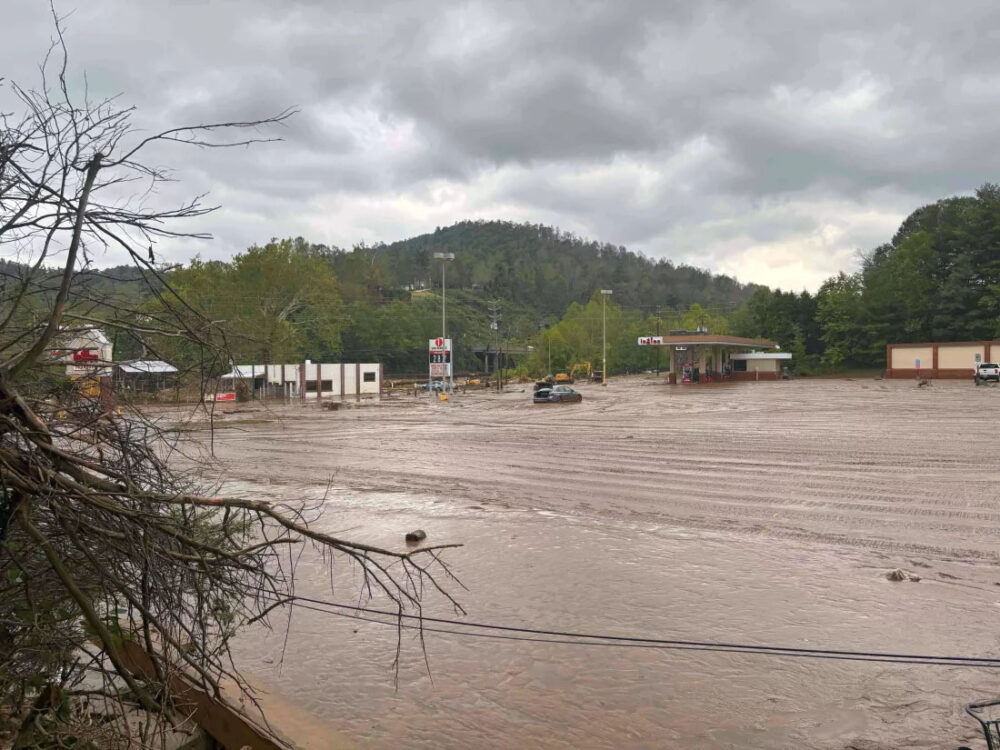
Spencer Bost via NPR
It will likely be weeks before the public gets a full picture of just how much devastation Hurricane Helene left across the southeastern U.S.
There are still areas without power, roads blocked, and a rising death toll with hundreds unaccounted for.
Angela Blanchard is the Chief Recovery and Resilience Officer for the City of Houston. She said there are ways Houstonians can help those impacted by the storm, and many already have.
“Houstonians are already stepping up, we’ve been there, we know what they’re facing,” Blanchard said on Monday’s Houston Matters. “So people are sending money and that’s critical at this stage, resourcing the organizations that are on the ground.”
She added that Blue Ridge Public Radio produced a comprehensive list of organizations active in the areas with many of them being rural and remote.
Blanchard said officials in cities like Ashville, N.C. are focused on “sanctuary and safety.”
“People have to find a roof over their heads, they have to get their basic needs met,” she said. “But never forget the first thing on people’s minds is connecting with loved ones. If they’re missing anyone still, the only thing they’re concerned about are ‘Where are the people I love? Where are the people I’m most connected to?'”
Blanchard said she and counterparts in other U.S. cities have roles that they can play in this. She is part of a network, mostly on social media, of “storm friends.”
“Those of us who’ve been through this pretty much try to encircle, particularly on the long term,” she said. “I think we can never forget we have such dramatic video and images coming out of these impacted areas now and at a gut level, we all really understand, we empathize.”
Blanchard said the southeast will be experiencing long-term recovery and will likely still deal with issues from the storm a year from now.
“I always remind people if you care deeply, mark your calendar a year from now. These folks will really still be struggling,” she said. “And now we have this unanticipated event concurrent, which is this strike that impacts port, that impacts goods like steel, wood, and appliances coming in. All of which these people will need.”
Blanchard said though storms are often called “unprecedented,” it’s important to set that word aside now.
“I think we do ourselves a disservice when we imagine that the disasters we’ll face in the future will be anything like those of the past,” she said. “It will all be now unprecedented. We are in the period in which many of us anticipated and thought about for many years, and that’s when you see one disaster follow another, follow another.”
Blanchard said people individually must be prepared for storms everywhere they are, year-round.
“We want very badly to think our risk exists within a constrained parenthetical period, but in fact we are now in a period where one thing happens upon another and follows another,” she said. “Things that we didn’t put in the playbook — 360 degrees preparedness, 365 days a year.”
Blanchard said this is not a form of pessimism but instead a form of climate realism.
“It’s time for us to fully embrace so that we can be our best, at our best when the worst happens.”




![Tyson Foods Plant [Photo: Food Manufacturing]](https://southarkansassun.com/wp-content/uploads/2023/08/iStock_1185520857__1_.5e441daa51cca-600x337.jpg)







![Silverado Senior Living Management Inc. [Photo: Los Angeles Times]](https://southarkansassun.com/wp-content/uploads/2023/10/download-6-4-600x337.jpg)

![China's Wuhan Institute of Virology [Photo: Nature]](https://southarkansassun.com/wp-content/uploads/2023/09/d41586-021-01529-3_19239608-600x337.jpg)
















